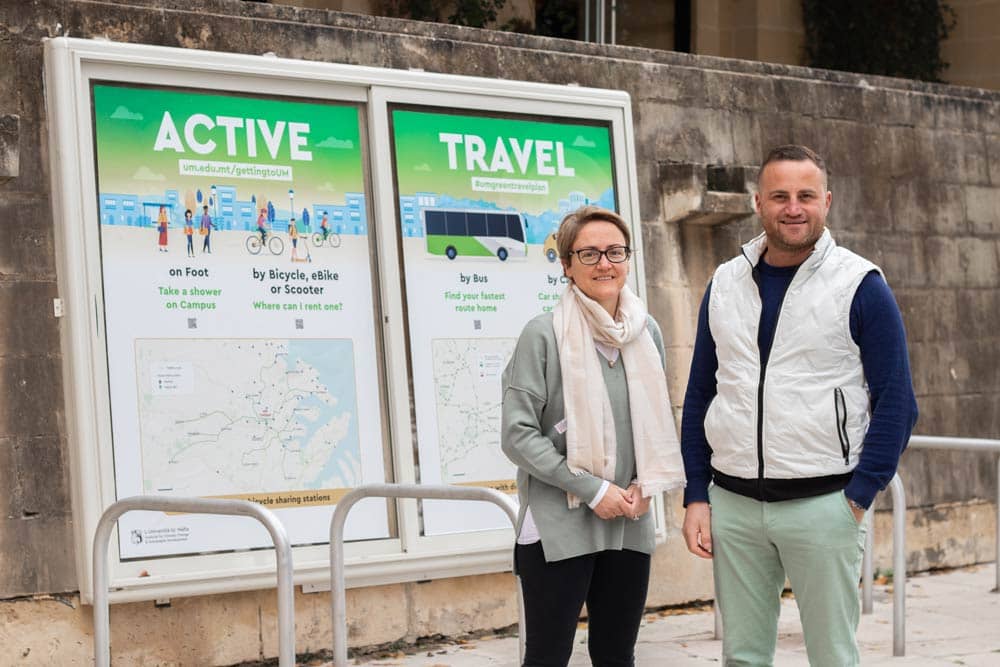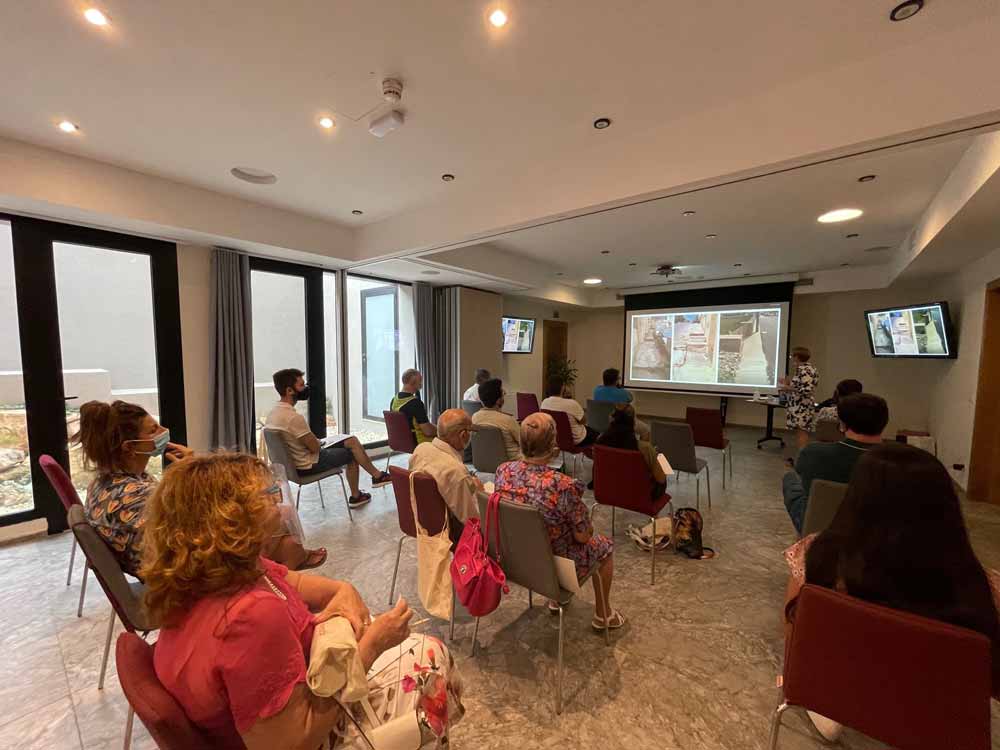Walking or cycling are challenging in Malta’s car-dominated infrastructure. ‘Active Travel’ is a University of Malta (UM) scheme that encourages students and staff to ditch cars in favour of healthier, greener alternatives. But changing Malta’s car culture is no walk in the park. Prof. Maria Attard (Director, Institute for Climate Change & Sustainable Development, UM) and Raphael Mizzi (UM’s Green Travel Plan Coordinator) speak to Jonathan Firbank about the project.
If a person is about to visit Malta for the first time, they will likely wonder how best to travel around. Perhaps there will be bike lanes or trams? Or would it be easier to walk? After all, the weather’s great, and Malta is one of the smallest countries in the world, smaller than most major cities.
In reality, the streets are lined with cars. Heavy traffic trundles past rows of parked vehicles, often in front of a remarkable number of car dealerships. There are four cars for every five people, two cars per household, and almost 60 new vehicles registered every day. From time to time, you might see Malta’s only public transport amidst the rivers of cars: the humble bus, nearly empty at times, late due to traffic.
Malta has a ‘car culture’ and a car infrastructure to match. Healthier means of travel are difficult, as missing or dangerous pavements are a major concern for pedestrians. The impact on people’s health cannot be understated. Recent studies indicate that over 500 Maltese lives are shortened annually due to air pollution.
The impact on climate change is similarly dire, placing Malta far behind all other EU countries in the race to curb carbon emissions. ‘Research shows that only active travel’— that is, people walking and cycling instead of driving— ‘can help cities achieve net zero within the timeframes that we require to do so’, says Prof. Maria Attard, Director of the Institute for Climate Change and Sustainable Development (ICCSD), UM. She describes Malta’s urban space as poorly maintained, with ‘poor design, complete neglect, or overly complicated and sometimes exclusionary infrastructure’. Green travel infrastructure ‘is either ignored, or it is provided for PR purposes rather than functional and inclusionary purposes. The reality should be the other way round.’

Raphael Mizzi is the Green Travel Plan Co-ordinator at the ICCSD. ‘People don’t like to walk. They’ll use a car for small errands or just to go around the corner. There is a mentality that when you reach 18, you buy a car, and it will give you more independence,’ reflects Mizzi. Independence can be hard to come by without a car when infrastructure is hostile to healthier transport.
Around 70 years ago, many institutions in Malta made use of the bicycle: mail carriers, police officers, army, RAF, and so on. The amount of cars on the road now make it almost impossible to commute healthily; it’s a ‘chicken and egg’ issue. Mizzi points out, ‘if you are walking, you will find obstructions and security issues such as poles, electricity boxes, or garbage in the middle of pavements, which might not be levelled.’
These aren’t problems inherited from a bygone era, either. ‘It’s saddening to see new projects that don’t cater for cyclists, that don’t have the necessary pedestrian infrastructure. There is a lack of planning and thinking. It results in a lot of small problems that add up to make an area unsafe for walking or cycling. This is not something which is being faced only by us Maltese,’ continues Mizzi, ‘it is happening all over the world. To change it, we all have to pull the same rope.’
Walking Workshops
Active Travel is a project the UM started in 2010 in order to promote and facilitate healthier, greener forms of transport. UM is situated in the heart of Msida, a densely built up and heavily congested area. A great deal of the campus is dominated by car parking spaces and a ring road that lacks proper paving or a bike lane. Attard describes the project as being born from necessity: ‘The focus on active travel is important because of the growing car dependence experienced over the years, on the islands and at university. The pressures of parking, increasing pollution, and the evident reluctance of individuals to walk or cycle had become issues that were difficult to ignore. Data kept showing us that many at UM live relatively close by and could indeed walk or cycle — the potential was there.’
The foundation of Active Travel’s work is research, and collecting information from Malta’s concrete jungle requires an active approach.A recent Active Travel workshop involved walking or cycling along routes around the university while taking pictures. These photographs would give any Maltese wanderer some unpleasant deja-vu. The commuters teeter over loose cinder blocks, walk tightrope-thin paths alongside traffic, and find their routes obstructed by rubbish and disappearing pavements. Oddly enough, there has been a recent push to criminalise jaywalking. If walking on the road became illegal, pedestrians might find themselves forced to break the law.

Finding safe routes for commuters is paramount and requires innovation. ‘We have a PhD researcher at the Institute for Climate Change and Sustainable Development, Carlos Cañas.’ explains Mizzi, ‘He is creating a walkability index around the university that uses ‘totems’ to indicate routes and distances. We are about to extend this network to another region of Malta.’ Active Travel has integrated walking groups with this network, targeting people from walkable areas. The groups’ safety is improved by the predetermined routes, and they, in turn, provide a valuable data source for the walkability index. For example, the groups take part in activities that challenge suggested walking times. Group workshops also provide an opportunity to invite local councillors to take part so they can experience Malta’s infrastructure problems first hand.
Active Incentives
Encouraging healthier modes of transport is complex. ‘Staff have a sum to spend on allocated materials every year. We have been able to have bicycles and cycling equipment included in that list of materials,’ says Mizzi. He goes on to explain: ‘we also organise campaigns to bring cyclists together every year.’ Providing free breakfasts for cyclists, for example, serves as an incentive but also serves to bring people together. This helps nurture a growing cycling community and helps cyclists share route ideas and issues with each other. Many of the concerns on campus have been solved with improvements to infrastructure. Campus showers and security measures like CCTV-monitored bike racks are simple ways to get people on their bikes. The emphasis is on growing a culture of active travel, described by Mizzi as ‘ingraining a cycling culture, creating this network, and then keeping it alive.’
Driving Change
Active Travel acts on the principle of ‘being the change you want to see in the world.’ If a culture of healthier, greener travel takes root at UM, it could positively influence the rest of the country. Mizzi believes Malta’s modest size makes this feasible. As for UM itself, he describes Active Travel as still being in ‘an initial phase of changing people’s mindsets.’ But visible change has occurred in recent years. ‘There are more bikes on the racks, more people walking. Even five years ago, you wouldn’t see carpooling or electric scooters. Things are improving. People are more concerned about the planet, and they want to be healthier. I think we have a positive future.’
As the results of Active Travel show, patterns of behaviour change far quicker if the right infrastructure is provided.
But while the long-term goal of a healthier Malta seems tantalisingly realistic, the global crisis of climate change demands faster solutions. Implementing those solutions requires more administrative power beyond that of a university. As the results of Active Travel show, patterns of behaviour change far quicker if the right infrastructure is provided. Malta’s government needs to seriously invest in green, active travel solutions.
As a country, ‘we lack in understanding, appreciation, design, and provision… all aspects necessary for the improvements in active travel infrastructure,’ states Attard. ‘We build infrastructure primarily for cars, and active travellers are generally a second or a last-minute consideration. Time and again, people tell us they would love to walk or cycle but are too afraid. So we know that safe, well-designed, and attractive active travel infrastructure would be of great benefit to our villages and towns, our contribution to climate targets, and overall to our health. If you build it, they will come. That’s how it works.’
Further Reading
Farrugia, K. (2021). Malta could miss its 2030 targets unless effective action is taken, expert warns. Independent. Retrieved 26 November 2021, from https://www.independent.com.mt/articles/2021-08-21/local-news/Malta-could-miss-its-2030-targets-unless-effective-action-is-taken-expert-warns-6736236119
Independent. (2020). Active Travel Report urges safer and more accessible streets surrounding campus. Retrieved 26 November 2021, from https://www.independent.com.mt/articles/2020-04-15/education/Active-Travel-Report-urges-safer-and-more-accessible-streets-surrounding-campus-6736222058
MaltaToday. (2017). Breaking our addiction to cars. Retrieved 26 November 2021, from https://www.maltatoday.com.mt/comment/editorial/78768/breaking_our_addiction_to_cars#.YaDXePHMJhESanz, C., Maas, S., & Attard, M. (2020). Active Travel Workshop Report. Institute for Climate Change and Sustainable Development. Retrieved from https://www.um.edu.mt/__data/assets/pdf_file/0003/432363/ActiveTravelWorkshopReport-ICCSD.pdf





Comments are closed for this article!